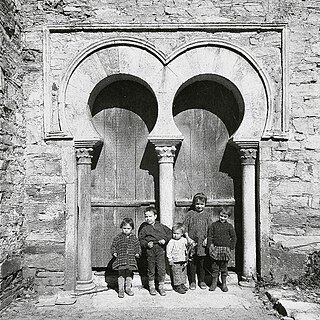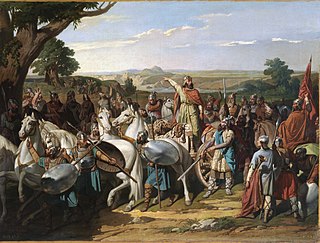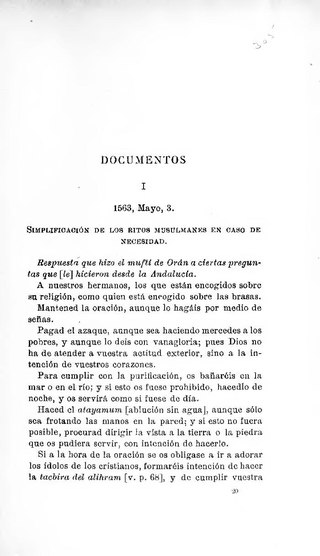
The Reconquista or the reconquest of al-Andalus was the successful series of military campaigns that European Christian kingdoms waged against the Muslim kingdoms following the Muslim conquest of the Iberian Peninsula by the Umayyad Caliphate. The beginning of the Reconquista is traditionally dated to the Battle of Covadonga, in which an Asturian army achieved the first Christian victory over the forces of the Umayyad Caliphate since the beginning of the military invasion. Its culmination came in 1492 with the fall of the Nasrid kingdom of Granada to the Catholic Monarchs.

The term Moor is an exonym first used by Christian Europeans to designate the Muslim populations of the Maghreb, al-Andalus, Sicily and Malta during the Middle Ages. Moors are not a single, distinct or self-defined people. The 1911 Encyclopædia Britannica observed that the term had "no real ethnological value." Europeans of the Middle Ages and the early modern period variously applied the name to Arabs, Berbers, and Muslim Europeans.

The Almohad Caliphate or Almohad Empire was a North African Berber Muslim empire founded in the 12th century. At its height, it controlled much of the Iberian Peninsula (Al-Andalus) and North Africa.

The Mozarabs, or more precisely Andalusi Christians, were the Christians of al-Andalus, or the territories of Iberia under Muslim rule from 711 to 1492. Following the Umayyad conquest of the Visigothic Kingdom in Hispania, the Christian population of much of Iberia came under Muslim control.

Al-Andalus was the Muslim-ruled area of the Iberian Peninsula. The term is used by modern historians for the former Islamic states in modern-day Gibraltar, Portugal, Spain, and Southern France. The name describes the different Muslim states that controlled these territories at various times between 711 and 1492. At its greatest geographical extent, it occupied most of the peninsula and part of present-day southern France (Septimania) under Umayyad rule. These boundaries changed constantly through a series of conquests Western historiography has traditionally characterized as the Reconquista, eventually shrinking to the south and finally to the Emirate of Granada.
The golden age of Jewish culture in Spain, which coincided with the Middle Ages in Europe, was a period of Muslim rule during which Jews were accepted in society and Jewish religious, cultural, and economic life flourished.
Convivencia is an academic term, proposed by the Spanish philologist Américo Castro, regarding the period of Spanish history from the Muslim Umayyad conquest of Hispania in the early eighth century until the expulsion of the Jews in 1492. It claims that in the different Moorish Iberian kingdoms, the Muslims, Christians and Jews lived in relative peace. According to this interpretation of history, this period of religious diversity differs from later Spanish and Portuguese history when—as a result of expulsions and forced conversions—Catholicism became the sole religion in the Iberian Peninsula.

The Nasrid dynasty was an Arab dynasty that ruled the Emirate of Granada from 1232 to 1492. It was the last Muslim dynasty in the Iberian Peninsula. Twenty-three sultans ruled Granada from the founding of the dynasty in 1232 by Muhammad I until 2 January 1492, when Muhammad XII surrendered all lands to Isabella I of Castile. Today, the most visible evidence of the Nasrid dynasty is the Alhambra palace complex built under their reign.
This is a timeline of notable events during the period of Muslim presence in Iberia, starting with the Umayyad conquest in the 8th century.

The Muslim conquest of the Iberian Peninsula, also known as the Arab conquest of Spain, by the Umayyad Caliphate occurred between approximately 711 and the 720s. The conquest resulted in the defeat of the Visigothic Kingdom and the establishment of the Umayyad Wilayah of Al-Andalus.

The Emirate of Córdoba or Umayyad Emirate of Córdoba was a medieval Islamic kingdom in the Iberian Peninsula.
Muladí were the native population of the Iberian Peninsula who adopted Islam after the Muslim conquest of the Iberian Peninsula in the early 8th century. The demarcation of muladíes from the population of Arab and Berber extraction was relevant in the first centuries of Islamic rule, however, by the 10th century, they diluted into the bulk of the society of al-Andalus. In Sicily, Muslims of local descent or of mixed Arab, and Sicilian origin were also sometimes referred to as Muwallad. They were also called Musalimah ('Islamized'). In broader usage, the word muwallad is used to describe Arabs of mixed parentage, especially those not living in their ancestral homelands.

Spain is a Christian majority country, with Islam being a minority religion, practised mostly by immigrants from Muslim majority countries, and their descendants.

Abu Abdullah Muhammad ibn Yusuf ibn Nasr, also known as Ibn al-Ahmar and by his honorific al-Ghalib billah, was the first ruler of the Emirate of Granada, the last independent Muslim state on the Iberian Peninsula, and the founder of its ruling Nasrid dynasty. He lived during a time when Iberia's Christian kingdoms—especially Portugal, Castile and Aragon—were expanding at the expense of the Islamic territory in Iberia, called Al-Andalus. Muhammad ibn Yusuf took power in his native Arjona in 1232 when he rebelled against the de facto leader of Al-Andalus, Ibn Hud. During this rebellion, he was able to take control of Córdoba and Seville briefly, before he lost both cities to Ibn Hud. Forced to acknowledge Ibn Hud's suzerainty, Muhammad was able to retain Arjona and Jaén. In 1236, he betrayed Ibn Hud by helping Ferdinand III of Castile take Córdoba. In the years that followed, Muhammad was able to gain control over southern cities, including Granada (1237), Almería (1238), and Málaga (1239). In 1244, he lost Arjona to Castile. Two years later, in 1246, he agreed to surrender Jaén and accept Ferdinand's overlordship in exchange for a 20-year truce.
The Berbers are an indigenous ethnic group of the Maghreb region of North Africa. Following the Muslim conquest of the Maghreb, most Berber tribes eventually became Muslims. Presently, about one-sixth of the population of Maghreb speaks one of the Berber languages, but most of them also speak some form of Arabic. Berbers are the first non-Arab people to have established an Islamic state.

The Emirate of Granada, also known as the Nasrid Kingdom of Granada, was an Islamic polity in the southern Iberian Peninsula during the Late Middle Ages, ruled by the Nasrid dynasty. It was the last independent Muslim state in Western Europe.

Muslims, Christians, and Jews co-existed for over seven centuries in the Iberian Peninsula during the era of Al-Andalus states. The degree to which the Christians and the Jews were tolerated by their Muslim rulers is a subject widely contested among historians. The history of Al-Andalus indicates that Muslims, Christians, and Jews who lived within Al-Andalus had relatively peaceful relations, with the exception of a few scattered revolts, and times of religious persecution. The great amount of cultural and social interaction that took place between these three distinct social and religious groups led to the creation of a unique and diverse culture that continued to flourish even after the Reconquista.

The Oran fatwa was a responsum fatwa, or an Islamic legal opinion, issued in 1502 to address the crisis that occurred when Muslims in the Crown of Castile, in present-day Spain, were forced to convert to Christianity in 1500–1502. It was authored by mufti Ahmad ibn Abi Jum'ah, an Algerian scholar of Islamic law of the Maliki school; the term "Oran fatwa" was applied by modern scholars, due to the word "Al-Wahrani" that appears in the text as part of the author's name.

Mudéjar were Muslims who remained in Iberia in the late medieval period following the Christian reconquest. It is also a term for Mudejar art, which was much influenced by Islamic art, but produced typically by Christian craftsmen for Christian patrons.
Musa ibn Abi al-Ghassan was a Muslim commander who lived during the final years of the Reconquista. He is known for his opposition to the surrender of the Muslims in Granada, which ended around 800 years of Muslim rule in Iberia.














